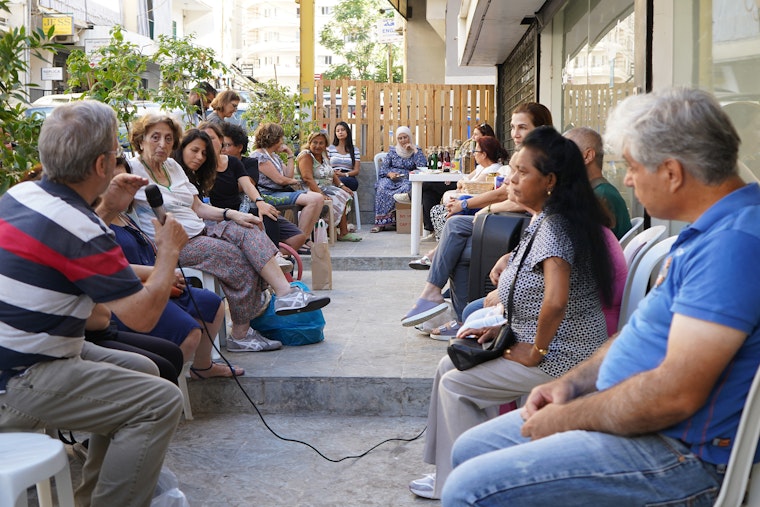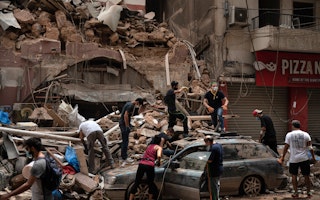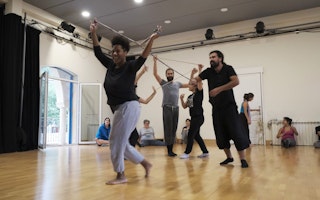This Store in Lebanon Sells Hope
By Mariam Younes

Lebanon faces a rapid currency devaluation, soaring living costs, widespread migration of youth, and collapsing public services. The livelihoods of residents are under threat. The crisis is not only hindering many people’s ability to secure a decent living, but also poses a grave risk to societal cohesion and ethical values. Many in Lebanon are fighting for people’s right to a decent living and for social solidarity during these arduous times.
This drive gave birth to a special grocery shop, called Mann Wa Salwa. The shop takes its name from a nougat-like Iraqi sweet made from the sap falling from trees in northern Iraq. The mission of the Mann Wa Salwa project is to establish a sustainable mini-market where communities come together to make basic food needs accessible and affordable. According to a joint statement by the UN’s World Food Program and Lebanon’s Ministry of Agriculture, nearly two million people, including 1.46 million Lebanese residents and 800,000 Syrian refugees, are presently facing food insecurity. Long steeped in the endemic corruption of its political and economic elite, Lebanon has been further strained in recent years by an economic crisis, the COVID-19 pandemic, political unrest, and the explosion of Beirut’s port in 2020, which destroyed huge segments of the city. State and donor assistance programs have failed to meet the escalating needs.
I helped launch the Mann Wa Salwa project. When my co-founder and I initiated the idea, we were worried that we would not be able to secure funding, because we were not a formal, established non-governmental organization. However, we had meaningful discussions with the Open Society Foundations about the project’s potential to develop a model of social assistance that transcends sectarian community support structures and goes beyond the more common cash assistance approach. We successfully obtained funding from Open Society in 2022. In March of this year, we opened our small social grocery shop in a suburb of Beirut. It is located in Furn Chebback, a formerly middle-class neighborhood whose standard of living dramatically collapsed in the last few years.
Our grocery shop is a participatory mini-market, where all stakeholders—owners, customers and employees alike—play an active role. Together, we choose the products and set the prices, allowing shoppers to access quality goods at affordable rates. We subsidize essential products such as rice, bulgur, pasta, and detergents, selling them at the same price we acquire them or even cheaper. Currently, our core team consists of four individuals (a project manager, an assistant, a researcher, and an accountant) who are daily immersed in the project. We also have volunteers helping out when they can, bringing the overall team to about 15 people.

A few team members oversee essential tasks such as stock management, supply, pricing, and sales. This operational structure helps reduce overhead expenses, allowing the grocery to offer even lower prices. People come with their own bags to fill them with these goods. Moreover, the social grocery fosters a friendly atmosphere of exchange and sharing, creating a sense of community and solidarity during shopping and volunteer service.
Our project, which aims to attract short-term grant support to help it achieve financial stability in these early years, primarily targets impoverished sections of the population, as well as middle-class residents negatively affected by the financial crisis. We also serve as a distribution outlet for local producers, to address supply chain challenges and help make high-quality local goods more widely available at affordable prices. In addition, we provide assistance to similar small cooperatives and grocery shops—one in Tripoli and another one in Beirut’s economically underprivileged Nabaa neighborhood. By strengthening these alternative local grocery initiatives, we are seeking to build a network that can have an impact on a bigger scale, but also to share knowledge, information and some operating costs such as transportation.
One of the aims of the Mann Wa Salwa grocery shop is to obtain official registration as a consumer cooperative and strengthen its volunteer and member base. We are already in discussions with the General-Directorate of Cooperatives at Lebanon’s Ministry of Agriculture to further this goal. Going forward, we hope to boost our self-sustainability and income through memberships to open additional branches in different parts of the country, to reach more communities in need.
Currently, the grocery shop has 15 members, 10 non-member shoppers, and 5 volunteers, and we hope to expand to 100 by mid-2024. We have already witnessed the positive impact of Mann Wa Salwa since its establishment as a tool for community organizing and socioeconomic solidarity. This model can influence the ways communities engage with each other and support one another and a more collective vision for a better future in Lebanon.
Mann Wa Salwa is a grantee of the Open Society Foundations.
Mariam Younes is co-founder of the Mann Wa Salwa grocery shop.


